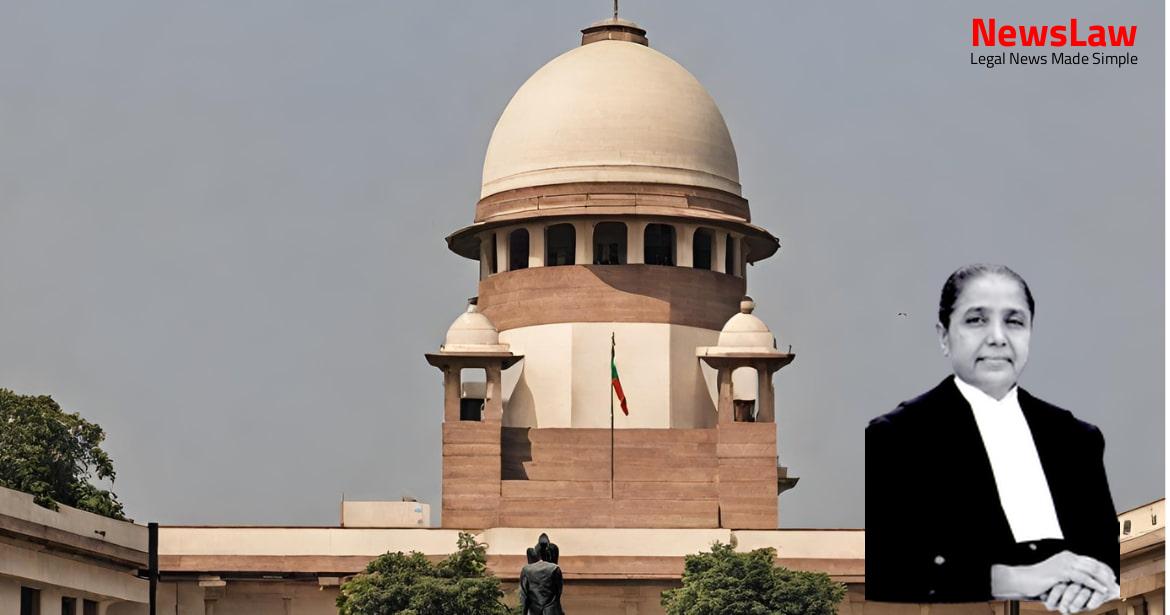Explore a detailed legal analysis focusing on agreements conflicting with statutory rules in a recent court judgment. The examination of Rule 18(3) alongside Rule 17 provides valuable insights into the enforcement of agreements and their alignment with property rights. The judgment sheds light on the consequences of contracts violating statutory regulations, underscoring the importance of legal compliance in private agreements.
Facts
- The plaintiff filed a Suit for specific performance of a sale agreement.
- The defendant-1(a) and defendant-1(b) were involved in the case.
- The first defendant passed away during the proceedings.
- The plaintiff claimed to have been put in possession of the property by the defendant.
- There were disputes regarding possession, non-alienation clauses, and the contract being cancelled.
- The plaintiff sought relief in the form of executing the sale deed and an injunction against the defendants.
- Various legal representatives and family members of the parties were involved in the case.
- The Trial Court did not decree the suit for specific performance but ordered a return of part of the advance amount.
- Numerous letters, agreements, and possession certificates were referenced throughout the proceedings.
- The High Court eventually allowed the plaintiff’s appeal and directed execution of the sale deed.
- Second defendant not a bonafide purchaser for value without notice of the Agreement to Sell dated 17.11.1982
- Alienation in favor of the second defendant hit by Section 52 of the Transfer of Property Act, 1882
- Trial Court partially decreed the Suit, ordered return of Rs.50,000/- with interest, and rejected the relief of permanent injunction
- Agreement dated 17.11.1982 found proved
- Plaintiff entitled to relief of specific performance as all sale consideration was paid, Second defendant not a bonafide purchaser, Suit decreed, directing defendants to convey property to plaintiff
- Plaintiff not entitled to enforce agreement to sell during 1985 due to allotment and lease-cum-sale agreement
- No oral agreement for Rs.1,50,000/- found, plaintiff not in breach
- Second defendant found to be bonafide purchaser for value without notice
- Plaintiff failed to prove being put in possession
- First defendant was unable to get sale deed from BDA until 1989, unable to cancel agreement unilaterally
- Plaintiff should have waited till expiry of lease period, always ready and willing
- No evidence of defendant trying to sell property to third party
- High Court found Suit maintainable
Also Read: Judicial Analysis on Back Wages in Employee Caste Verification Case
Issue
- The main issue at hand is whether the agreement to sell in this case violates Section 23 of the Contract Act.
- Section 23 of the Contract Act specifies certain conditions under which agreements are considered void.
- The crux of the issue lies in determining if the agreement in question falls within the prohibitions outlined in Section 23.
- The validity of the agreement hinges on whether it complies with the restrictions set forth in the Contract Act.
Also Read: Interpretation of Suspension Rules in Employment Case
Arguments
- The petitioner drew support from the Bangalore Rules of Allotment, 1972, specifically Rule 18(2) which imposes a ten-year embargo against alienation.
- The petitioner cited the judgments in Kedar Nath Motani v. Prahlad Rai and Narayanamma v. Govindappa to support her argument.
- She argued that the agreement relied upon by the plaintiff was unlawful and therefore specific performance should not have been granted.
- Contended that the suit was not maintainable and premature.
- She highlighted that the agreement was unlawful as it contravened public policy and Section 23 of the Indian Contract Act, 1872.
- Pointed out the terms of the lease-cum-sale agreement between the first defendant and the BDA, emphasizing the prohibition against alienation for ten years.
- Emphasized that for a court to grant specific relief, the agreement in question must be lawful.
- The appellant emphasized that they cannot claim the agreement in question was unlawful and highlighted the application of the Doctrine of Lis Pendens as correctly found by the High Court.
- The appellant challenged the High Court’s finding that the second defendant was not a bonafide purchaser for value.
- The appellant argued that even if Lis Pendens did not apply, the lack of bonafide purchase for value by the second defendant should be a reason for the Court not to interfere.
- The appellant pointed out the necessity of rushing to the civil court due to the circumstances involving the first defendant’s definite stand and the limitation act.
- The appellant relied on case law to assert the validity of the agreement to sell in their favor.
- The appellant mentioned the first defendant’s obligation to obtain and deliver the absolute sale deed to the plaintiff as per the agreement.
- The appellant contended that the agreement was void and unenforceable.
- The appellant argued that the lease-cum-sale agreement did not prohibit the allotee from entering an agreement to sell the site.
- The appellant discussed the timing of performance in the agreement and the findings of absence of bonafides in the claim.
- The appellant addressed the issue of possession delivery and the time of repudiation of the agreement under the Limitation Act.
Also Read: Legal Analysis of Assignment and Ratification in Property Law
Analysis
- The analysis focuses on the interpretation and application of Rule 18(3) in conjunction with Rule 17.
- Rule 18(3) restricts alienation of the site or building by the allottee/lessee for a period of 10 years from the date of allotment.
- The illegality of the contract arises from the agreement’s conflict with the statutory rules.
- The agreement to sell imposed obligations contrary to the mandate of the law and froze the first respondent’s ability to construct a building.
- Enforcing the agreement would defeat the purpose of the law and public policy.
- The doctrine of lis pendens is discussed in relation to transfers made during legal proceedings.
- The statutory lease-cum-sale agreement under Rule 17 regulates the transfer and construction obligations of the parties.
- The legislative intent behind Section 61 of the Reforms Act is highlighted to emphasize restrictions on land transfers.
- The consequences of enforcing the agreement on both parties’ rights and obligations are carefully examined.
- The analysis also delves into the implications of the agreement’s terms on the allottee’s actions and the legality of the contract.
- Considerations of public interest, financial obligations, and eligibility criteria under Rule 10 are taken into account.
- The judgement illustrates the impact of the agreement on property rights, timeframes for contract performance, and the vendor’s obligations.
- The scrutiny of the agreement against legal provisions reveals the conflict between private contracts and statutory regulations.
- Key points include the restriction on alienation, refusal of performance, and adherence to the lease-cum-sale agreement terms.
- The analysis highlights the need to align private agreements with statutory laws and designates specific intervals for contract-related actions.
- Rule 3 of the Act pertains to the offer of sites for allotment by the Board.
- The allotment of a site is subject to various conditions and restrictions specified in the rules.
- Rule 11 lays down the principles for the selection of applicants for allotment of sites.
- Section 23 prohibits the use of holding for industrial purposes.
- Section 29 grants the Board the power to acquire, hold, and dispose of property.
- Various rules and provisions govern the allotment, sale, or transfer of sites by the Board.
- Section 34 imposes a ceiling on land holdings, with Section 35 declaring excess land acquisition as invalid.
- Section 84-C deals with the invalidity of land transfer or acquisition beyond specified limits.
- The Court’s interpretation indicates that a contract for land purchase between agriculturists is valid unless expressly prohibited by a statute.
- The expression ‘date fixed for the performance’ is considered a crystallized notion in legal contexts.
- Public policy dictates that if the illegality in a contract is trivial and the plaintiff does not rely on it, the defendant should not benefit from it.
- The courts examine whether the illegality in a contract is so fundamental that the plaintiff cannot proceed with the case without relying on the illegal transaction.
- In cases where an agreement involves the conveyance of property that requires authorization, relief can be granted by the court in certain circumstances.
- The doctrine of ‘turpis causa’ is explained and exceptions to the rule are discussed.
- The principle of ‘in pari delicto potior est conditio defendentis’ is considered in cases of illegal agreements.
- Various cases and judgments are referenced to elucidate the legal principles surrounding illegal agreements and specific performance.
- The distinction between trivial illegality and fundamental illegality in contracts is emphasized for the application of legal remedies.
- The court’s stance in enforcing illegal agreements is outlined based on public policy and legal principles.
- Case law and interpretations of legal statutes are evaluated to determine the legality and enforcement of agreements.
- The absence of a prayer by the Plaintiff for specific performance renders the original suit for specific performance and permanent injunction not maintainable.
- The case of Mohinder Kaur v. Sant Paul Singh has been cited to support the view that without a prayer for specific performance, the suit is not maintainable.
- The agreement dated 17.12.1982 should not be enforced, forming an independent ground for non-suiting the plaintiff.
- The Doctrine of Lis Pendens is based on the maxim ‘pendente lite nihil innovetur’, meaning that during pending litigation, no new changes should be introduced.
Decision
- An allottee had the option to voluntarily surrender the site allotted to them to the Board.
- The vendor agreed to provide specific documents to the purchaser for the sale deed.
- The vendor agreed to obtain necessary permissions for transfer from the competent authority.
- The sale transaction was to be completed within three months of obtaining the absolute sale deed.
- Non-payment within the stipulated period could lead to forfeiture of earnest money and cancellation of allotment.
- Every allottee was required to construct a residential building on the site as per approved plans.
- The value of the site was fixed and had to be paid along with additional interest if applicable.
- The lessee was entitled to surrender the site and receive the value deposited along with interest.
- The lessee was to comply with the conditions in the agreement, including construction timelines.
- The vendor agreed to sell the site to the purchaser for a specified amount and period for registration of sale deed was mentioned.
- The purchaser paid an advance amount towards the purchase.
- The purchaser was put in possession of the property as a tenant for a specified period.
- Interest would be applicable for non-payment within the extended period.
- The power to extend the period for payment was vested in the Board until 29.05.1980.
Case Title: G.T. GIRISH Vs. Y SUBBA RAJU (D) BY LRS (2022 INSC 51)
Case Number: C.A. No.-000380-000380 / 2022



